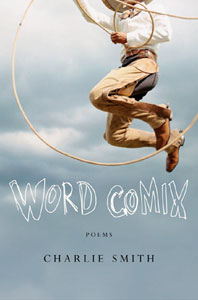

Reviews
Word Comix
by Charlie Smith

Word Comix
by Charlie Smith
W. W. Norton, 2009; 96 pages; $23.95
ISBN 978-0-393-06762-0, hardcover
http://books.wwnorton.com/books/Author.aspx?id=7107
Reviewed by Hilary Sideris
In his new book of poems, Word Comix, Charlie Smith continues to dazzle his readers with lines as surprising and strange as they are emotionally resonant. Smith eschews the autobiographical, and can be coolly ironic, but even in his irony there's a deep sadness, an acceptance, an embrace almost, of failure and loss.
Many of these poems follow the contours of dramatic monologue and resemble the reflections of unreliable narrators, deluded heroes — travelers, lovers, soldiers, dictators, and addicts. They take us through a series of American landscapes — "a Gulf station in the dusty West of movies" ("Hollyhocks"), a Florida beach town where "the aged bougainvillea" is "pulling itself together/so you know there's going to be world " ("Winter Mornings in Kendall"), a New York City street whose trees — a cypress, two honey locusts, and an oak — the poem's speaker loves "like my own brothers" ("Illustrated Guide to American Trees"), and the dark Faulknerian place where, among "the expectorate and the feculent lost phenomena…old men lay down to try the earth on for size" — getting ever closer to death, but not to self-knowledge ("Clean").
Smith startles us with unexpected shifts in register, as in the poem "Like Odysseus, Like Achilles," where Homer wonders why at his age he can't stop thinking of women:
he can't shake the habit, the loneliness
and the harsh poetry of life are simply too much
w/out chicks in it….
In "An Orange Light in the Windows," the agitated speaker asks himself:
Where did you put
the thingamajig that was going to save you?
The speaker of "Child's Play" recalls his lost youth, spent "drunk laid out/among Indian borrachos," as:
those years when instead of
playing Major League ball
I went in another direction and had a devil of a time
getting to my feet.
The hero of the title poem, "Word Comix," muses, "People think I have a positive attitude,/ but no, I'm one of the dusty breed":
smalltime operator wearing his mother's underwear
and divided against himself, as all operators are,
a short man with backlit teeth,
over-perfumed, in a personal sense,
who asks himself in four languages if now he isn't ashamed,
ill at ease among friends,
cannonfodder, in a romantic sense, solemnicist, straggler,
at the usual frontiers, unintentionally funny….
Whether a serpentine creature, sliding on its belly through the human refuse of torn letters and discarded wedding rings, or an ex-husband noticing, in an expired driver's license photo, "the sadness in my ex-wife's face: it was there all the time." Smith's speakers have in common the modest expectations of those who are capable of loving other people, but bound to fail them. In "I Speak to Fewer People," an aging veteran of love affairs, after each of which "each participant/received a little gift," still hopes to meet someone on his walks:
someone I have been headed toward all my life,
or simply someone without too much guile, a friendly
person with a little intelligence. Maybe we will
walk along together, talking about romance or trucks.
"Oh Yeah" describes a friend's sudden realization that "no one knew anything, really, about how to keep loving/anyone, anyone at all," and concludes:
You can sense the sun, the spectacular evaporate,
erasing everything, that's how you take it, personally,
as if a secret shelter is slowly being exposed to scrutiny
or the joke's starting to make sense.
Playful as his poetry often is, Smith has a way of taking it personally. He plays hard at loss, and takes seriously the game of finding a language for grief.
Hilary Sideris' work has recently appeared in Barrow Street, Green Mountains Review, Natural Bridge, Salamander, and Pomegranate Seeds: An Anthology of Greek-American Poetry, edited by Dean Kostos. She is the author of The Orange Juice is Over, from Finishing Line Press.